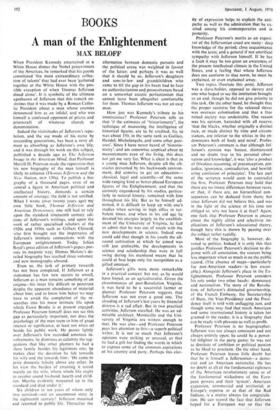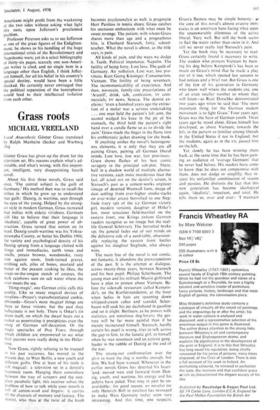BOOKS A man of the Enlightenment
MAX BELOFF
When President Kennedy entertained at a White House dinner the Nobel prizewinners of the Americas, he remarked that his guests constituted 'the most extraordinary collec- tion of talents' that had ever been 'gathered together at the White House with the pos., sible exception of when Thomas Jefferson dined alone'. It is symbolic of the ultimate apotheosis of Jefferson that this remark en- shrines that it was made by a Roman Catho- lic President about a man whose enemies denounced him as an infidel, and who was himself a confessed opponent of priests and priestcraft of whatever church or denomination.
Indeed the vicissitudes of Jefferson's repu- tation, and the use made of his name by succeeding generations, has been a story al- most as absorbing as Jefferson's own life; and it was through his work on this subject, published a decade ago as The Jefferson Image in the American Mind, that Professor Merrill D. Peterson made the reputation that his new biography of the man himself is likely to enhance (Thomas Jefferson and the New Nation, OUP 130s). To publish a bio- graphy of a thousand pages, even of so central a figure in American political and intellectual history, demands a certain amount of courage; the field is not untitled. When I wrote (over twenty years ago) my own little book, Thomas Jefferson and American Democracy, one still had to rely upon the standard nineteenth century edi- tions of Jefferson's writings, and upon the work of rather specialised scholars of the 1920s and 1930s such as Gilbert Chinard, who first brought out the importance of Jefferson's intimate connections with the European enlightenment. Today Julian Boyd's great edition of Jefferson's papers pur- sues its majestic way; Dumas Malone's de- tailed biography has reached three volumes; and new monographs abound.
Even so, the task of primary research has not been completed. If Jefferson as a statesman has few new secrets to unveil, Jefferson as a man remains something of an enigma—his inner life difficult to penetrate despite the apparent abundance of material about him; and to know him better we may have to await the completion of the re- searches into his more intimate life upon which Fawn Brodie is at present engaged. Professor Peterson himself does not see this gap as particularly important, nor does the psychology of the man seem to him of great interest or significance, at least not when set beside his public work. He passes lightly over Jefferson's few recorded amorous in- volvements; he dismisses as calumny the sug- gestions that like other planters he had a slave family besides his legitimate one; he makes clear the devotion he felt towards his wife and she towards him: 'He came to prize domestic felicity above any other. In his view the burden of attaining it rested mainly on the wife, whose whole life ought to revolve round husband, hearth and child- ren. Martha evidently measured up to the standard and died under it.'
Six children in ten years of whom only two survived—not an uncommon story in the eighteenth century! Jefferson mourned and returned to public life. Thereafter the alternation between domestic pursuits and the political arena was weighted in favour of the latter; and perhaps it was as well that it should be so. Jefferson's daughters and sons-in-law and grandchildren who came to fill the gap in his heart had to face an authoritarianism and possessiveness based on a somewhat ascetic perfectionism that cannot have been altogether comfortable for them. Thomas Jefferson was not an easy man.
How just was Kennedy's tribute to his omniscience? Professor Peterson tells us that 'if the estimates of "historiometry", the technique of measuring the intelligence of historical figures, are to be credited, his IQ was about 150, in the same rank as Galileo, Handel, Michelangelo, and some other geni- uses'. Since I have never heard of 'historio- metry', and am somewhat sceptical about IQ measurements even of the living, this does not get me very far. What is clear is that as a young man Jefferson, despite all the ob- stacles presented by his backwoods environ- ment, did contrive to get an education— classical, legal and scientific—of the same wide-ranging kind as better-placed European figures of the Enlightenment, and that the curiosity engendered by his studies, particu- larly in natural history, remained with him throughout his life. But as he himself ad- mitted, it is difficult to keep up with one's studies when serving in high office in tur- bulent times, and when in his old age he devoted his energies largely to the establish- ment of the University of Virginia, he had to admit that he was out of touch with the new developments in science. Indeed one could add that though in his youth the all- round cultivation at Which he aimed was still just attainable, the developments in science and scholarship that were in full swing during his manhood meant that he could at best hope only for recognition as a gifted amateur.
Jefferson's gifts were more remarkable in a practical context; but not, as he would have hoped, as an agriculturalist. Given the circumstances of post-Revolution Virginia, it was hard to be a successful farmer or planter; Professor Peterson suggests that Jefferson was not even a good one. The clouding of Jefferson's last years by financial distress is a sad affair. But in two practical activities, Jefferson excelled. He was an ad- mirable architect; Monticello and the Uni- versity of Virginia are witness enough to that. He was also—and Professor Peterson pays less attention to this—a superb political writer. It is not so much that Jefferson's opinions were striking or unusual, as that he had a gift for finding the words in which to express some of the common aspirations of his country and party. Perhaps this clar-
ity of expression helps to explain the anti- pathy as well as the admiration that he ex cited among his contemporaries and in posterity.
Professor Peterson's merits as an exposi- tor of the Jeffersonian creed are many: deep knowledge of the period; close acquaintance with the texts; and a general if not uncritical sympathy with Jefferson himself. If he has a fault it may be too great an awareness of the present intellectual climate in the United States, and a feeling that where Jefferson does not conform to that norm, he must be explained, or even explained away. ..
Two topics illusrtate this point. Jefferson was a slave-holder, opposed to slavery and one who hoped to see the institution brought to an end, though he did not give priority to this task. On the other hand, he thought that the proper recourse for the released slaves was overseas colonisation and that a free mixed society was undesirable. One reason was his opinion, hazarded with all reserve,
`that the blacks, whether originally a distinct race, or made distinct by time and circum- stances, are inferior to the whites in the en- dowments both of body and mind'. Profes- sor Peterson's comment is that although Jef- ferson's opinion was 'honest, disinterested and no doubt true to his personal obser- vation and knowledge', it was 'also a product of frivolous reasoning, of preconception, pre- judice, ignorance, contradiction, and bewild- ering confusion of principles'. The last part of the sentence would seem to contradict the first. Professor Peterson may hold that there are no innate differences between races, or that, if there are, no hierarchical con- sequences can be deduced from them; but since Jefferson did not believe this, and was in the light of the science of his time not obliged to, why not leave it at that? Again, one feels that Professor Peterson is uneasy about the highly elitist and selectivist im- plications of Jefferson's educational theory, though here this is shown by passing over the subject rather rapidly.
Most of the biography is, however, de- voted to politics. Indeed it is only this that justifies Professor Peterson's decision to dis- pense with all annotation, the sources being less important when so much is on the public record. (The absence of maps—particularly for non-American readers—is less excus- able.) Alongside Jefferson's place in the En- lightenment, Professor Peterson considers his role under two other heads: democracy and nationalism. The story of the Revolu- tion, of Jefferson's distracted governorship, of the French Embassy, the Secretaryship of State, the Vice-Presidency and the Presi- dency itself is told with unflagging zest, and though some may find that much American and some international history is taken for granted in the reader, it is a biography that can be ready with pleasure as well as profit.
Professor Peterson, is no hagiographer; Jefferson was not always consistent and not always entirely open; he could be a power- ful infighter in the party game; he was not as destitute of ambition or political passion as he liked to proclaim. On the other hand, Professor Peterson leaves little doubt but that he is himself a Jeffersonian—a demo- crat and an American nationalist. He has no doubt at all of the fundamental rightness of the American revolutionary cause or of the fundamental wickedness of the Euro- pean powers and their 'system'. American expansion, commercial and territorial, at Europe's expense or at that of the Red Indians, is a matter always for congratula- tion. He can record the fact that Jefferson hoped for a European war so that the Americans might profit from the weakening of the two sides without asking what light this casts upon Jefferson's proclaimed pacifism.
Professor Peterson asks us to see Jefferson as one of the great figures of the Enlighten- ment; he shows us his handling of the huge international crisis of the Revolutionary and Napoleonic wars; yet in a select bibliography of thirty-six pages, scarcely one non-Ameri- can writer is cited, and no single item in a language other than English. I think Jeffer- son himself, for all his belief in his country's special destiny, would have been a little shocked. He certainly never envisaged that the political separation of the hemispheres would lead to their intellectual isolation from each other.































 Previous page
Previous page